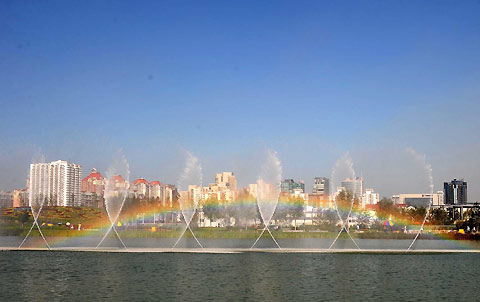Some temporary measures brought in to tackle pollution in Beijing during the Olympic Games are set to become permanent, in a bid to address continuing environmental challenges, despite the recent improvement in air quality, an official said Saturday.
The removal and treatment of heavy-polluting vehicles will be accelerated and plans to reduce construction site dust will be stepped up, Du Shaozhong, deputy director of the Beijing environmental protection bureau, told a news conference.
 |
|
A rainbow rises along side fountains against the clear sky in Beijing Olympic Park Friday. [Xinhua]
|
The city will also require heavily-polluting companies to address their pollution problems as a prerequisite to resuming operations after the Games, he said.
"If they can't resolve the pollution problems, they must stop or limit their production," he said.
But Wang Li, deputy director of the city's traffic administrative bureau, told the conference that as of yet there are no plans to continue with the odd-even license plate restriction once the Olympics has finished, despite its success in cutting pollution and calls for the continuation of the measure.
"The rule is closely related to everyone's daily life. We want to hear more public opinion on the whether, or how, to keep the rule," she said.
Bureau figures released Saturday showed that since the opening of the Games on Aug 8, the city's air quality has ranged from between excellent and fairly good on the pollution index, the cleanest for any summer period in the past 10 years.
 |
|
Beijing Olympic park welcomes the athletes and tourists all over the world against a clear blue sky in this August photo. [Xinhua]
|
The average daily air pollution index (API) so far this month was 56, far below 81 reported last year. Major air pollutants on average dropped 40 percent over the same period last year, with nitrogen oxide emissions directly related to vehicles down by 61 percent, according to the bureau.
Foreign experts have also spoken highly of Beijing's improvement in air quality, such as Ivo Allegrini, head of the air pollution department at the Italian National Research Center, and a member of the Beijing environment protection bureau's 12-member expert panel on air quality assessment during the Games.
"The city's air quality was highly satisfactory during the Games in the past two weeks. Pollutant data were no higher than that in most developed Western urban cites," Allegrini said in an interview Saturday.
Beijing's efforts to tackle air pollution is one of the best examples of how to reduce pollution in a city for important events such as an Olympics, he said.
Another expert, Andreas Wahner, director of the Institutes for Chemistry of Germany, said: "Beijing's air quality control measures have received a remarkable improvement as major pollutant concentration has declined to reach WHO guidance."
However, Du was also realistic about the challenges in the future.
"Although the Olympic Games will end soon, the environmental challenges we face are by no means over."
He has also called for public involvement in pollution control. He said the city would draw experience from the Olympics to organize volunteers to get involved in the daily environment protection administration, and continue to reward those who report illegal pollution activities.